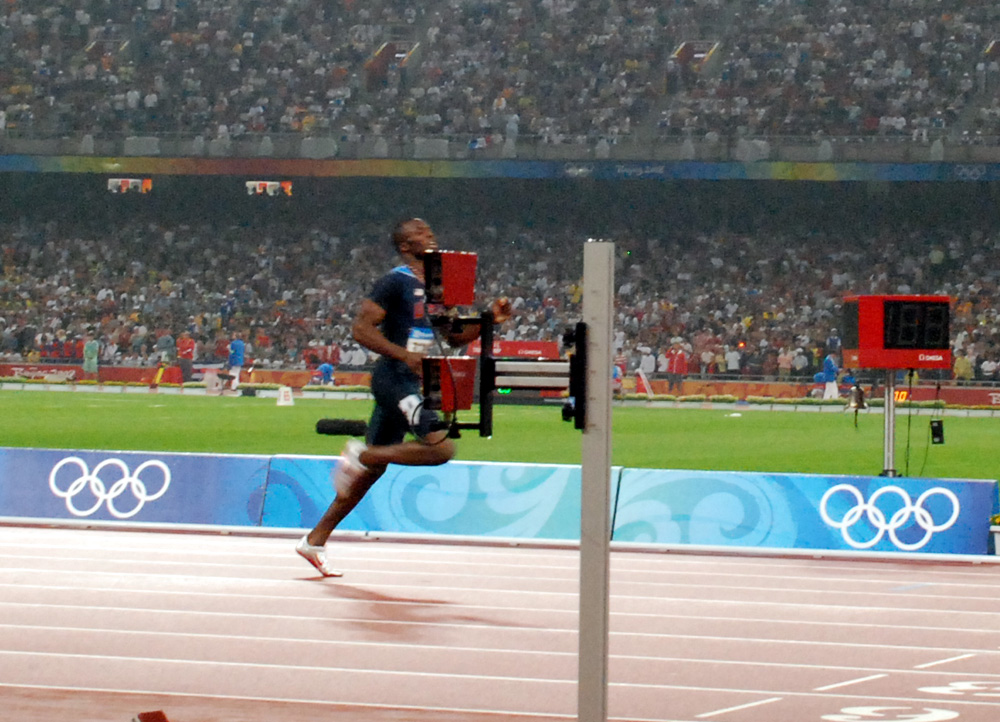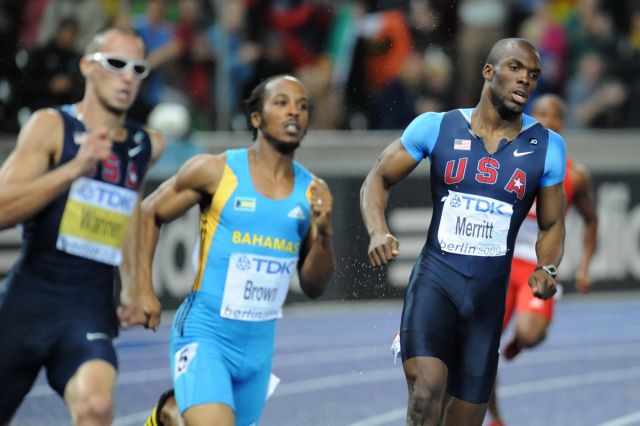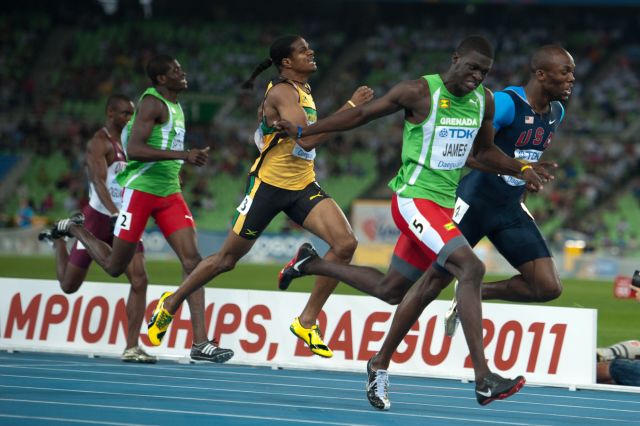1. Early life and background
LaShawn Merritt's early life was shaped by his family, his diverse interests, and significant personal challenges, which ultimately led him to a career in track and field.
1.1. Childhood and family
LaShawn Merritt was born on June 27, 1986, in Portsmouth, Virginia. Growing up, he was heavily influenced by his older brother, who was exceptionally skilled not only in sports but also in music, particularly the trumpet. Merritt's early interests were varied; he began playing baseball at the age of five and also excelled in American football, where his speed was a notable asset. Following his brother's musical talents, Merritt joined the brass band in middle school, playing both the trumpet and the horn, and even composed pieces for the band.
A profound tragedy struck Merritt's family in November 1999, when he was 13 years old. His 19-year-old brother died in an accident, reportedly after being pushed from a university dormitory window by an unknown assailant. The shock of this loss led Merritt to abandon the sports he had pursued under his brother's influence. However, his sister later encouraged him to take up track and field, marking a pivotal moment in his life.
1.2. Education
Merritt attended Woodrow Wilson High School in Portsmouth, Virginia, where he graduated. Following high school, he enrolled at East Carolina University as a college athlete. During his first season of indoor track, he signed an endorsement contract with Nike, which rendered him ineligible to compete in NCAA events. Consequently, Merritt transferred to Old Dominion University in Norfolk, Virginia. He later pursued studies in business administration at Norfolk State University, also located in Norfolk.
1.3. Early career development
Merritt began his serious engagement with track and field at the age of 15. By the following year, he had already achieved significant success, winning the 400 meters at the state championships and securing second place in both the 100 meters and 200 meters. During this period, he met Dwayne Miller, who was serving as an assistant coach for the track and field team at Woodrow Wilson High School. Miller became Merritt's coach, and their partnership marked the beginning of his professional training. When they first met, Miller famously told the teenage Merritt, "Let's go to the Olympics together!" a statement that initially made Merritt laugh heartily.
When Merritt turned professional in February 2005, he initially trained under a coach assigned by Nike, his sponsor. However, this coach's approach, which involved forcing Merritt-whose body was not yet fully developed-to undergo the same rigorous training as other professional athletes, proved unsuccessful. Recognizing this, Merritt returned to his hometown in the off-season of 2005 and requested Dwayne Miller to resume coaching him. This decision proved crucial for his development.
2. Athletic career
LaShawn Merritt's professional track and field journey is marked by a series of significant achievements, intense rivalries, and a notable comeback after a doping ban, solidifying his legacy as one of the sport's greats.
2.1. Junior career
Merritt first gained prominence as a junior athlete at the 2004 World Junior Championships in Athletics held in Grosseto, Italy. He secured a gold medal in the 400 meters race, finishing the year as the top-ranked junior in the world for the event. His versatility was also evident as he set two junior world records as part of the American 4 × 100 meter and 4 × 400 meter relay teams. In the 4 × 100 meter relay, he ran the anchor leg. His strong performance in the 200 meters, recording 20.72 seconds that year (ranking him fourth among U.S. juniors), further highlighted his potential as a dual threat in short sprints.
2.2. Early senior career and rivalry
Merritt transitioned into the senior ranks in 2005, participating in his first major senior championship at the 2005 World Championships in Athletics in Helsinki, Finland. He served as a relay substitute for the men's 4 × 400 meter team, helping the team win their heat. Although he was substituted for Jeremy Wariner in the final, the American team went on to win the gold medal.
In 2006, Merritt was selected for the 4 × 400 meter relay team for the 2006 IAAF World Indoor Championships in Moscow, Russia. Alongside Tyree Washington, Milton Campbell, and Wallace Spearmon, he contributed to winning the World Indoor title. Outdoors, he improved his personal best to 44.14 seconds, earning a bronze medal at the 2006 IAAF World Athletics Final in Stuttgart, Germany. He also represented the United States at the 2006 IAAF World Cup in Athens, Greece, where he won the 400 meters competition.
The year 2007 marked Merritt's individual establishment in senior competition. At the 2007 World Championships in Athletics in Osaka, Japan, he achieved his first sub-44 second run, finishing in 43.96 seconds. While this was enough to beat 2000 Olympic champion Angelo Taylor, it placed him second to the reigning World and Olympic champion Jeremy Wariner, who finished half a second ahead. This silver medal was Merritt's first individual medal at a global championship in the 400 meters. He again contributed to the United States' 4 × 400 meter relay team, securing gold alongside Wariner and Taylor, finishing three and a half seconds ahead of Bahamian team. With Wariner absent from the field, Merritt went on to win the gold medal at the 2007 IAAF World Athletics Final.
Merritt's 2008 season was characterized by an intense rivalry with Wariner, who had been dominant in the 400 meters since 2004. Their duels frequently took place at the 2008 IAAF Golden League meetings. Merritt secured his first major win over Wariner at the Internationales Stadionfest in Berlin. He then confirmed his place on the Olympic team by winning at the 2008 United States Olympic Trials, again defeating Wariner. Later in July, Wariner narrowly edged Merritt by 0.01 seconds at the Golden Gala meeting. At the Meeting Gaz de France in Paris, the final Golden League competition before the Olympics, Wariner appeared to gain momentum with a winning time of 43.86 seconds.
2.3. Olympic and World Champion

LaShawn Merritt achieved significant victories at the 2008 Summer Olympics in Beijing, China. Despite expectations of a close race with Jeremy Wariner in the 400 meters final, Merritt dominated, winning by a record margin of 0.99 seconds-the largest in an Olympic 400 meters final. His time of 43.75 seconds was a new personal best and made him the fifth fastest 400 meter runner on the all-time lists at that point. He then joined Wariner, Angelo Taylor, and 400 meter bronze medallist David Neville for the men's 4 × 400 meter relay. The team set a new Olympic record with a time of 2:55.39, which was also the second fastest in the history of the event, surpassing the previous Olympic record that had stood since the 1992 Barcelona Olympics.
Weeks after the Olympics, Merritt lost to Wariner at the Weltklasse Zürich by a significant margin, though Wariner's winning time of 43.82 seconds was still slower than Merritt's Olympic winning run. However, Merritt secured his fourth win over Wariner that season at the 2008 IAAF World Athletics Final. Although they had each beaten the other during the season, Merritt had won all the most crucial races, concluding the season as the Olympic and American champion over 400 meters and taking home the World Athletics Final prize money. He chose to skip the 2009 indoor season to focus on improving his running and technique.

With Wariner already qualified for the 2009 World Championships in Athletics as the defending champion, Merritt won the 400 meters at the 2009 US Championships relatively uncontested, equaling his world-leading time of 44.50 seconds. At the World Championships in Berlin, Germany, he went on to win the 400 meters in a world-leading time of 44.06 seconds, once again defeating Wariner. He also secured a gold medal in the 4 × 400 meter relay.
2.4. Doping ban and return
In October 2010, LaShawn Merritt was issued a 21-month competition ban, backdated to October 2009, after testing positive three times for DHEA and pregnenolone. The American Arbitration Association's ruling accepted Merritt's explanation that he had unintentionally consumed the banned substances, which were contained within a male enhancement product called ExtenZe.

After serving his competition ban, Merritt made his return to the track in 2011. He finished second at the Stockholm Diamond League meeting with a time of 44.74 seconds. As the defending 2009 World Champion for the 400 meters, he received a berth to the 2011 World Championships in Athletics in Daegu, South Korea. At the championships, he set a world-leading time of 44.35 seconds in the heats. He ultimately won the silver medal in the 400 meters, finishing behind teenager Kirani James of Grenada, despite leading for most of the race. Merritt then ran the final leg of the United States' gold medal-winning 4 × 400 meter relay team, helping them secure victory after coming out of the final bend in third place.
2.5. Later career and Olympic medals
Merritt was the number one qualifier at the 2012 Olympic Trials. However, two weeks before the track and field events at the 2012 Summer Olympics in London, United Kingdom, Merritt tweaked his hamstring at the Herculis meet in Monaco. As a result of this injury, he pulled up in a qualifying heat of the 400 meters at the London Olympics and did not finish the race, ending his bid to defend his Olympic title.
Merritt made a strong comeback at the 2013 World Championships in Athletics in Moscow, Russia, where he won gold medals in both the 400 meters and the 4 × 400 meter relay.
At the 2015 World Championships in Athletics in Beijing, China, Merritt secured a silver medal in the 400 meters with a time of 43.65 seconds, a new personal best. He also contributed to the United States' gold medal win in the 4 × 400 meter relay.
Merritt qualified once again for the U.S. team for the 400 meters at the 2016 Summer Olympics in Rio de Janeiro, Brazil. He ran a very fast time of 43.85 seconds but only managed to win the bronze medal. He finished behind defending Olympic champion Kirani James of Grenada, who took silver with 43.76 seconds, and Wayde van Niekerk of South Africa, who won the gold medal with a new world record time of 43.03 seconds. Merritt then served as the final leg runner for the 4 × 400 meter relay team, securing a gold medal in that event, eight years after his first Olympic relay gold.
Merritt announced his retirement from competitive athletics following the 2017 World Championships in Athletics in London, where he competed in the 400 meters, finishing 20th in the semifinals with a time of 45.52 seconds.
3. Personal bests and records
LaShawn Merritt is one of only six men in history to have broken 20 seconds for the 200 meters and 44 seconds for the 400 meters. The other athletes to achieve this rare dual feat are Michael Johnson, Isaac Makwala, Wayde van Niekerk, Michael Norman, and Fred Kerley.
His personal best of 43.65 seconds for the 400 meters, set in Beijing on August 26, 2015, was the fastest non-winning time in history until the 2024 Olympic final, where Matthew Hudson-Smith lowered this record to 43.44 seconds.
| Event | Time (sec) | Venue | Date |
|---|---|---|---|
| 100 metres | 10.56 | Lynchburg, Virginia, United States | March 31, 2007 |
| 200 metres | 19.74 | Eugene, Oregon, United States | July 8, 2016 |
| 300 metres | 31.23 | Kingston, Jamaica, Jamaica | June 11, 2016 |
| 400 metres | 43.65 | Beijing, China | August 26, 2015 |
| Indoor events | |||
| 60 metres | 6.68 | Lynchburg, Virginia, United States | February 18, 2006 |
| 200 metres | 20.40 | Fayetteville, Arkansas, United States | February 12, 2005 |
| 300 metres | 31.94 | Fayetteville, Arkansas, United States | February 10, 2006 |
| 400 metres | 44.93 | Fayetteville, Arkansas, United States | February 11, 2005 |
| 500 metres | 1:01.39 | New York City, New York, United States | February 10, 2012 |
As of September 2024, Merritt holds the following track records for 200 meters and 400 meters:
200 metres
| Location | Time | Windspeed m/s | Date |
|---|---|---|---|
| Greensboro, North Carolina | 19.80 | +3.2 | April 19, 2008 |
| Nassau | 19.78 | +0.9 | April 16, 2016 |
400 metres
| Location | Time | Date |
|---|---|---|
| Daegu, South Korea | 44.35 | August 28, 2011 |
| Edmonton, Canada | 44.30 | July 6, 2014 |
| Moscow, Russia | 43.74 | August 13, 2013 |
| New York City, United States | 44.19 | June 14, 2014 |
| Ostrava, Czech Republic | 44.16 | June 17, 2014 |
| Ponce, Puerto Rico | 44.14 | May 17, 2014 |
| Raleigh, North Carolina, United States | 44.72 | March 28, 2008 |
4. Major competition results
LaShawn Merritt's career is highlighted by numerous medals at the most prestigious international athletics competitions, including the Olympic Games and World Championships.
| Year | Competition | Venue | Event | Result | Time | Notes |
|---|---|---|---|---|---|---|
| 2004 | World Junior Championships | Grosseto, Italy | 400 m | 1st | 45.25 | |
| 4 × 100 m relay | 1st | 38.66 | Junior World Record | |||
| 4 × 400 m relay | 1st | 3:01.09 | Junior World Record | |||
| 2005 | World Championships | Helsinki, Finland | 4 × 400 m relay | 1st | 3:00.48 | Ran in heats; did not compete in final where U.S. won gold with 2:56.91 |
| 2006 | World Indoor Championships | Moscow, Russia | 4 × 400 m relay | 1st | 3:03.24 | |
| World Athletics Final | Stuttgart, Germany | 400 m | 3rd | 44.14 | Personal Best | |
| World Cup | Athens, Greece | 400 m | 1st | 44.54 | ||
| 4 × 400 m relay | 1st | 3:00.11 | ||||
| 2007 | World Championships | Osaka, Japan | 400 m | 2nd | 43.96 | Personal Best |
| 4 × 400 m relay | 1st | 2:55.56 | ||||
| World Athletics Final | Stuttgart, Germany | 400 m | 1st | 44.58 | ||
| 2008 | Olympic Games | Beijing, China | 400 m | 1st | 43.75 | Personal Best |
| 4 × 400 m relay | 1st | 2:55.39 | Olympic Record | |||
| World Athletics Final | Stuttgart, Germany | 400 m | 1st | 44.50 | ||
| 2009 | World Championships | Berlin, Germany | 400 m | 1st | 44.06 | |
| 4 × 400 m relay | 1st | 2:57.86 | ||||
| World Athletics Final | Thessaloniki, Greece | 400 m | 1st | 44.93 | ||
| 2011 | World Championships | Daegu, South Korea | 400 m | 2nd | 44.63 | |
| 4 × 400 m relay | 1st | 2:59.31 | ||||
| 2012 | Olympic Games | London, United Kingdom | 400 m | - | DNF | Did not finish due to hamstring injury |
| 2013 | World Championships | Moscow, Russia | 400 m | 1st | 43.74 | Track Record |
| 4 × 400 m relay | 1st | 2:58.71 | ||||
| 2014 | IAAF World Relays | Nassau, Bahamas | 4 × 400 m relay | 1st | 2:57.25 | Championship Record |
| Continental Cup | Marrakech, Morocco | 400 m | 1st | 44.60 | Representing Americas | |
| 2015 | IAAF World Relays | Nassau, Bahamas | 4 × 400 m relay | 1st | 2:58.43 | |
| World Championships | Beijing, China | 400 m | 2nd | 43.65 | Personal Best | |
| 4 × 400 m relay | 1st | 2:57.82 | ||||
| 2016 | Olympic Games | Rio de Janeiro, Brazil | 400 m | 3rd | 43.85 | |
| 4 × 400 m relay | 1st | 2:57.30 | ||||
| 2017 | IAAF World Relays | Nassau, Bahamas | 4 × 400 m relay | 1st | 3:02.13 | |
| World Championships | London, United Kingdom | 400 m | 20th (sf) | 45.52 |